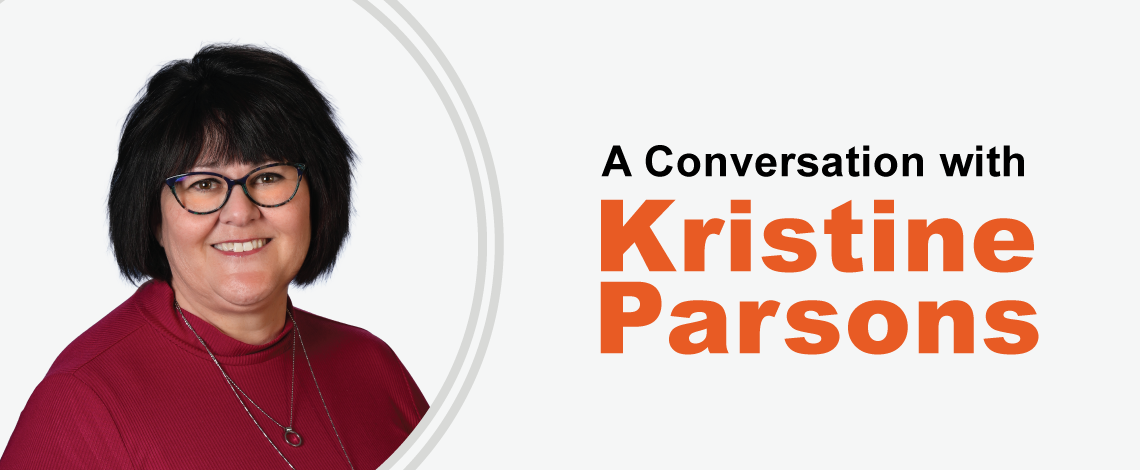Undertaking her fourth term as Chair of the College Council, Kristine Parsons RECE, with 34-years of experience in the profession, is as committed as ever to doing all she can to serve the early learning sector. It was this drive to serve the profession that led her to join the Council in 2017, where she has held various leadership roles since. A deep passion for the important work that RECEs do, coupled with a roll-up-her-sleeves attitude, keeps her motivated at a time when the profession is under significant stress.
Here, Kristine shares her reflections on leadership, legacy and the fundamental role that resiliency and collaboration play in building a strong, healthy profession.
The College’s Strategic Plan (launched in 2022) set the College up to support RECEs in their practice and help address systemic challenges to ensure the profession is resilient and sustainable. Tell us about the work the College is carrying out in its third year of the plan that makes you proud to be in the profession.
There is political will and public interest to increase the number of child care and early learning centres, and secure the number of RECEs that this growth demands. The work we are doing at the College toward proactive public protection and working in meaningful, innovative ways with the many partners and interest holders in the sector, is about ensuring that critical growth doesn’t compromise quality in the profession. It is vitally important to promote the value of qualified educators to enhance and maintain public trust in the profession.
I’m particularly excited about activities we’re carrying out as part of our commitment to diversity, equity, inclusion and belonging. For example, we’re making efforts to identify and address racism and discrimination in the sector. We’re also developing a collaborative approach to assessing post-secondary programs in early childhood education offered by Indigenous post-secondary institutions to ensure we are removing systemic barriers, so programs are assessed equitably. In learning about Indigenous post-secondary programs, I was struck by how they really highlight in their teachings the idea of building resiliency.
Resiliency has been an important theme for you as a leader and individual, particularly when we know how deeply burnout has impacted ECEs.
Resiliency is what every educator needs to draw on especially on those harder days. I spend a great deal of time talking to educators about filling our own cup first. In fact, we need to fill our resiliency bucket beyond capacity so that it’s overflowing, so that our capacity isn’t slowly depleting while we’re continually needing to give from it.
In a highly regulated profession such as ours, we often feel the need to be perfect. But we don’t have to be perfect as individuals. We can lean on each other, learn from each other, and work as a collective that embraces and leverages each of our individual strengths.
Collaboration is very much a hallmark of your leadership style. Tell us about the importance of collaboration in creating a strong organization and profession.
No one individual can do it all themselves. Whether as Director at RisingOaks Early Learning Ontario or as the head of the Council, I draw on the knowledge, lived experience and expertise of others. As a College Council, when we’re looking into the future to think strategically about what the profession and children in Ontario need one year or five years out, that takes a collective of thinkers, decision makers and risk takers. We need this diverse “landscape” within the Council so that we can gauge the climate out there in the profession, and ensure that the decisions we make consider the needs of all 63,000 professionals and the children they care for in various settings – rural, urban, in child care centres, at school boards, in the plethora of other capacities that this profession has.
Our end goal is doing what’s in the best interest of children and families. We might not make everyone happy, but at Council, we make sure that everyone at the table has been heard and walks away from it saying, “I’m comfortable with the decision we’ve made.” I’m honoured to lead the Council alongside these incredible people who serve the profession.
A part of leadership is making difficult decisions. Earlier this year, the Council approved a fee adjustment which was recently announced to members.
It isn’t a decision we entered into lightly and we had many, many meetings to discuss it. It came down to making sure that the College was equipped to do the things we need to do to contribute to a viable, thriving profession.
This isn’t just a job; it’s a career. I am proud to work in a career that is regulated. When you work with the most vulnerable population, it is validating to have recognition that this work is so important that it must be done by qualified, trustworthy professionals. It is our job as a College to protect the public – children and their families.
But that is not the only thing that the College does. The wealth of professional resources on the website demonstrates that people at the College care a lot about RECEs and about the profession. Like anything, the work involved in protecting children and families, and creating resources and providing support to RECEs has a price.
What do you hope to achieve most for the profession?
A healthy profession and a healthy College that’s there to support the profession.
Going back to the idea of the collective, we all need to be careful stewards of this profession and those in it. The young people of today that RECEs care for are going to be the caretakers of this land, of this profession, of many professions. The legacy we leave will feed the future.
Learn more about Kristine:
- Re-elected Council Chair Kristine Parsons on building bridges toward a strong, sustainable workforce
- Kristine Parsons RECE Elected Council Chair
- In conversation with Kristine Parsons

